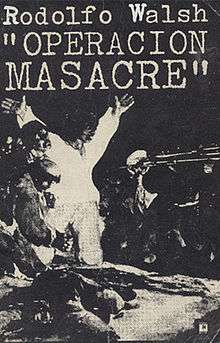Operación Masacre
 | |
| Author | Rodolfo Walsh |
|---|---|
| Country | Argentina |
| Language | Spanish |
| Genre | Nonfiction/Literature |
| Publisher | De La Flor |
Publication date | 1957 |
| Media type | |
| Pages | 236 pp (Paperback edition) |
| ISBN | 978-950-515-352-7 (Paperback edition) |
| OCLC | 11558530 |
Operación Masacre ("Operation Massacre") is a nonfiction novel of investigative journalism, written by noted Argentine journalist and author Rodolfo Walsh. It is considered by some to be the first of its genre. It was published in 1957, nine years before the publication of Truman Capote's In Cold Blood, a book often credited as the first major nonfiction novel of investigative journalism.[1]
Synopsis
The book details the José León Suárez massacre, which involved the June 9, 1956 capture and shooting by the Buenos Aires Province Police of a group of men who were suspected of being involved with a Peronist uprising that same night led by General Juan José Valle. Walsh claims that the men were arrested before the establishment that night of martial law, were never properly charged, and were therefore unlawfully shot. The book is divided into three sections: in the first, Walsh provides portraits of the victims of the shooting; in the second, he reconstructs the events of the night in question; in the third, he shares testimonies from the head of the Buenos Aires Province Police, among others, that unequivocally betray the complicity of the de facto state and make a case for the unlawful and disgraceful execution of the men in question. The most recent editions of the book in Spanish and English also include additions (listed as "Appendices") to the text written by Walsh for the various editions of the book that came out after its first publication in 1957.
History
Walsh received a tip-off about the secret operation in December 1956, while he was playing chess in a café.[2] Operación Masacre was originally published in May–July 1957 as a series of articles in the journal Mayoría, where it was subtitled "A book without a publisher" as an indication of the problems Walsh had had securing an outlet for his story.[3] These articles were later re-written into the book Operación Masacre.
In 2013, an annotated English translation by Daniella Gitlin, "Operation Massacre," was published by Seven Stories Press.[4]
Reception and criticism
Literary critic Ángel Rama described Operación Masacre as a "police novel for the poor."[5] The novel explores themes of violence that are not only unexpected, but are also unpunished,[6] although Pedro Eugenio Aramburu would ultimately be executed in 1970 by the Peronist Montoneros for his role in the José León Suárez massacre.
Daniel Link argues that the book "destabilizes literary genres" and anticipates what would later be called testimonial fiction.[7] This form of writing has proven to be problematic to some literary analysts because some have seen the need to match the documented historical narrative with the events in the literary text itself, leading to challenges of verification for those seeking proof of historical accuracy and reliability.[8]
Film adaptation

Operación Masacre was adapted into a 1973 film by director and writer Jorge Cedrón, starring Norma Aleandro, Carlos Carella, Víctor Laplace, Ana María Picchio and one of the survivors of the José León Suárez massacre, Julio Troxler.[9]
Notes
References
- Bollig, Ben (April 2006). "Violence without Reason: On Argentine Short Stories". Journal of Iberian & Latin American Studies. Taylor & Francis. 12 (1): 79–90. doi:10.1080/14701840600704565. Retrieved 2008-05-23. (EBSCO subscription required for online access.)
- Foster, David William (January 1984). "Latin American Documentary Narrative". PMLA. PMLA, Vol. 99, No. 1. 99 (1): 41–55. JSTOR 462034. doi:10.2307/462034. (JSTOR subscription required for online access.)
- Link, Daniel (2007). "Rethinking Past Present". Review: Literature and Arts of the Americas. Routledge. 40 (2): 218–230. doi:10.1080/08905760701627711.
- McCaughan, Michael (2002). True Crimes: Rodolfo Walsh, the Life and Times of a Radical Intellectual. London: Latin American Bureau. ISBN 1-899365-43-5.
- Rama, Angel (1983). Literatura y clase social. Mexico City: Folios Ediciones. ISBN 968-478-035-4.
- Waisbord, Silvio (2000). Watchdog Journalism in South America: News, Accountability, and Democracy. New York: Columbia University Press. ISBN 0-231-11975-5.